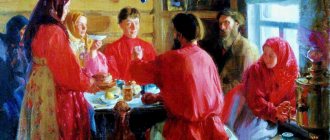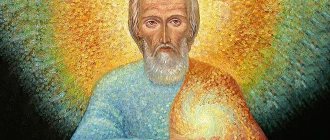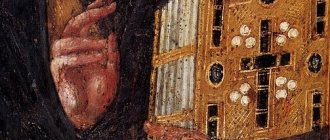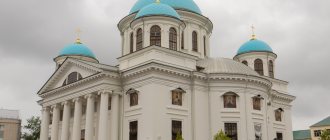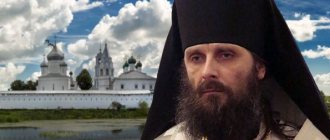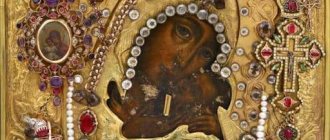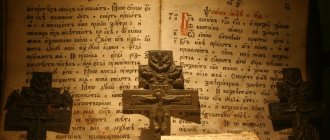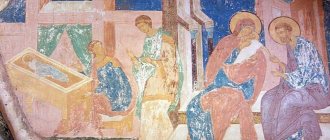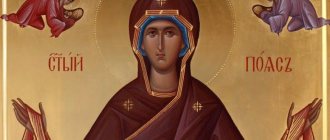Hieromartyr Hilarion (Trinity)
“The exiled episcopate, as a sign of special respect, elected St. Hilarion (Trinity) as archpastor - head of the Solovetsky Orthodox clergy. In Solovki, the senior bishop was commemorated “Solovetsky”. The eldest was the saint called “...The Most Reverend Hilarion, Archbishop of Solovetsky” (Nun Seraphim)
Saint Hilarion (Trinity)
“I earnestly ask you to pay attention to the extremely provocative counter-revolutionary activities of Tikhonov’s assistant Hilarion... while preaching... he made such a pogrom speech that physical clashes took place in the crowd in the fence and on the street and the matter ended with arrests. Over the ten days they have experienced, Tikhon’s followers have become extremely insolent, behave defiantly and are ready to proceed to beatings, and this mood - definitely pogrom and clearly anti-Soviet - is created by him, Bishop Hilarion. If a limit is not put on his clearly counter-revolutionary activities, then public unrest and the beating of church renovationists are inevitable.” ( Priest Vladimir Krasnitsky. From a denunciation to the OGPU. July 6, 1923)
Life before the red revolution
Saint Hilarion (in the world Vladimir Troitsky) was born on September 13, 1886 in the family of priest Alexei in the village of Lipitsa, Kashira district, Moscow province. There were four more children in the family - the youngest Dimitry, Alexey, Olga and Sofia.
Saint Hilarion received an excellent theological education: 1900 - graduation from the Tula Theological School, 1906 - completion with honors of the course at the Tula Theological Seminary and admission to the Moscow Theological Academy. In 1910, Vladimir Troitsky graduated from the academy with a candidate of theology degree and became a professorial fellow. On December 11, 1912, he defended his master’s thesis, which was published under the title “Essays on the History of the Dogma of the Church” in 1912. For his student work, he was awarded two awards - the Moscow Metropolitan Macarius Prize for the best semester essay and the Metropolitan Joseph Prize of Moscow for the best candidate's work (1910). The dissertation was awarded the Moscow Metropolitan Macarius Prize in 1912.
Scientific activity for Troitsky was inseparable from asceticism and church life: in 1910, Vladimir Troitsky, a graduate of the academy, was left for scientific work and teaching. Simultaneously with the awarding of Vladimir Troitsky a master's degree in theology at the very beginning of 1913, he was confirmed as an associate professor at the academy in the department of New Testament. In 1913 Troitsky became a professor. He was associated with the academy until May 1920, the time of his ordination as Bishop of Verei.
On March 28, 1913, Vladimir took monastic vows with the name Hilarion. On April 11, 1913, Troitsky was ordained a hierodeacon, on June 2, a hieromonk, and on July 5, Father Hilarion was elevated to the rank of archimandrite. Saint Hilarion (Trinity) was not only a born monk, scientist and teacher: God at the right moment called him to the highest church and public service; his nature as a church leader was characterized by a saintly scope. This new turn in his life’s path occurred in 1917, when he had to participate in the Local Council of the Russian Church.
Saint Hilarion (Trinity)
Local Council of the Russian Church and the role of the saint in the restoration of the Patriarchate
Father Hilarion came to the Council with the idea of the need to restore the patriarchate in the Russian Church. On October 23, the saint delivered his famous speech at the Council, “Why is it necessary to restore the patriarchate?” Immediately after the election of the Patriarch, Archimandrite Hilarion becomes his secretary and chief consultant on theological issues. The Patriarch was faced with the most difficult task of preserving the Church. In all contacts with the Soviet government - during negotiations with Tuchkov, meetings with the “revolutionary” clergy, etc. - St. Hilarion was always under enemy attack, shielding the Patriarch with himself.
First arrests
In the spring of 1919, Archimandrite Hilarion was imprisoned in Butyrka prison. In May 1920, Archimandrite Hilarion was elevated to the rank of saint. After the decree of the All-Russian Central Executive Committee of February 1922 on the confiscation of church valuables, which led to popular unrest, a wave of repressions rolled across the country. In April 1922, Patriarch Tikhon was arrested. Even earlier, on March 22, Saint Hilarion found himself under arrest, and it fell to his lot to share the Patriarch’s cross. In June he is sent for a year from Moscow to Arkhangelsk. In June 1923, Patriarch Tikhon was released. Hilarion, who was elevated to the rank of archbishop, became the main executor of the will of the Patriarch and his right hand. The saint did not yet know that the fate of the Solovetsky prisoner was destined for him.. In the summer of 1923, Saint Hilarion performed an unprecedented holy act: he re-consecrated the throne and the cathedral of the Sretensky Monastery on Bolshaya Lubyanka Street with a great rite. By this he showed that the sin and wickedness of apostasy from the Church require special purification. Word of this immediately spread not only throughout Moscow, but throughout Russia. Neither the leaders of renovationism nor the security officers could forgive St. Hilarion for this defeat. The head of the VI “church” department of the SO GPU, E.A. Tuchkov, demanded that reconciliation begin with the renovationist “archbishop” Evdokim Meshchersky. The Patriarch most decisively refused. A few days later, Archbishop Hilarion was arrested, on whom the security officer Tuchkov placed the main responsibility for the failure of his policy.
Tuchkov Evgeniy Alexandrovich (1892-1950?)
A professional provocateur and church executioner, born in 1892 in the village of Telyakovo, Suzdal district, Ivanovo-Voznesensk province. He received four years of education, worked in a confectionery shop and a leather and shoe workshop, and later as a clerk in rear headquarters. After the revolution, Evgeny Tuchkov joined the party, and in 1918 he joined the Cheka. For some time he worked in Ufa, headed the ChON detachment, and then the secret department of the GubChK. From 1922 to 1929, Tuchkov led the secret 6th “church” branch of the OGPU. In 1928 he entered Moscow State University, but after studying for a year and failing, he left the university. Dismissed from the NKVD of the USSR in 1939 due to the inability to provide work in this area. It is this date that should be considered the date of the death of the Russian Orthodox Church. There was no one left to shoot. In the 40s, Evgeniy Aleksandrovich worked as a lecturer for the Knowledge Society (with 4 school classes!!). Died in the early 50s.
The path to Solovki is just beginning
Vladyka was sentenced to three years in concentration camps. On January 1, 1924, he was brought to the transit point on Popov Island, and in June he was sent to Solovki. Legends began to circulate about him on Solovki. The world also learned about him thanks to the book “The Unquenchable Lamp” by Boris Shiryaev, a former Solovetsky prisoner. Not only Shiryaev, but also other witnesses report that the only Easter service in the history of the Solovetsky camp (1926) was led by St. Hilarion (Troitsky). According to the recollections of the Solovetsky prisoner priest Pavel Chekhranov, the service held by St. Hilarion took place secretly from the authorities in an unfinished bakery. Apart from Father Paul, only two people took part in it - Bishop Nektary (Trezvinsky) and Archbishop Hilarion (Troitsky). In the camp, the bishop enjoyed great respect. Believers saw him as a spiritual father, and non-believers saw him as a missionary. The authority of the saint was so high that soon information about his camp activities reached the emigration. Thanks to him, the Solovetsky camp of the 20s became a kind of spiritual center.
Saint Hilarion became one of the authors of the “Message of the Solovetsky Confessors” or “Memoir of the Solovetsky Bishops” (05.27-06.09.1925), which expressed the will of a group of bishops, which became, as it were, an unspoken church council. The “Message” contained the principles of coexistence of the Church and godless state power; she continued the policy line led by Patriarch Tikhon. The compilers of the “Message” announced the systematic persecution of the Church in the Soviet Union and exposed the lies of renovationism. They called for the consistent implementation of the law on the separation of Church and state, on the desire of the Church to act without government officials.
Death of Saint Hilarion
At the end of the summer of 1925, the saint was transferred from Solovki to the Yaroslavl prison. A year later, the saint was given a new three-year term. In the spring of 1926, the saint again found himself in Solovki. In the fall of 1929, St. Hilarion's term of imprisonment was ending. However, already in October the bishop was exiled to Central Asia for three years. During this stage, the saint contracted typhus and was taken to a Leningrad prison. It was no longer possible to help him. In delirium, the holy martyr said: “Now I am completely free!” The doctor who was present at his death witnessed how the saint thanked God, rejoicing at his close meeting with Him. He went to Christ with the words: “How good! Now we are far from...” This happened on December 15/28, 1929.
1924 - 1926. Solovki. Special purpose camp
On November 15, 1923, Archbishop Hilarion was arrested, and on December 7, an NKVD commission sentenced him to three years in prison on Solovki.
In January 1924, the archbishop arrived at the transit point on Popov Island. Here he was caught by the news of Lenin's death. At the time when the coffin with Lenin’s body was lowered into the grave in Moscow, prisoners, by order of the camp authorities, had to stand silently for five minutes. Vladyka Hilarion was lying on a bunk when in the middle of the barracks stood a line of prisoners, among whom were clergy. “Stand up, you’re a great man after all, and he’ll hit you if he’s noticed,” the prisoners convinced him. Everything ended well, however, and Vladyka, turning to the clergy, said: “Think, fathers, what is happening in hell now: Lenin himself appeared there, what a triumph for the demons.”
In June 1924, after the opening of navigation, Archbishop Hilarion was sent to Solovetsky Island; here he knitted nets at the Filimonovskaya fishing ground, was a forester, and a watchman in the Philippi Hermitage. At Filimonovskaya Tone, ten kilometers from the main Solovetsky camp, he was with two bishops and several priests. He spoke good-naturedly about this work of his: “Everything is given by the Holy Spirit: formerly fishermen were theologians of display, but now, on the contrary, theologians are fishermen of display.” In the camp he retained his monastic non-covetousness, gentleness and simplicity. He simply gave everyone everything they asked of him. He never responded to any insults from those around him, seemingly not noticing them. He was always peaceful and cheerful, and even if something was bothering him, he tried to hide it behind his complacency.
Those who knew him in Solovki wrote about him: “He was accessible to everyone... it was easy for everyone with him. The simplest appearance - that’s what the Lord was. But behind this ordinary form of gaiety one could gradually discern childlike purity, great spiritual experience, kindness and mercy, this sweet indifference to material goods, true faith, genuine piety, high moral improvement. His ordinary appearance hid his inner activities from people and saved him from hypocrisy and vanity. He was a resolute enemy of all hypocrisy and ostentatious piety. Vladyka questioned each priest who arrived at the Solovetsky camp in detail about all the circumstances preceding his imprisonment.
- Why were you arrested? - Vladyka asked the abbot of one of the monasteries who arrived at the camp. “Yes, I served prayer services at my home when the monastery was closed,” he answered, “well, people gathered, and there were even healings...” “Oh, that’s right, there were even healings... How many Solovki did they give you?” - Three years. “Well, that’s not enough, more should be given for healings, the Soviet government overlooked...”
Wanting to involve Archbishop Hilarion in a schism, the security officer Tuchkov ordered to transport him from Solovki to the Yaroslavl GPU, provide him with a separate cell, the opportunity to engage in scientific work, conduct business correspondence and receive any books from outside, and in the meantime try to persuade him to cooperate with the GPU. On July 5, 1925, Archbishop Hilarion was transferred from the Solovetsky camp to the Yaroslavl political detention center. Once here, he wrote to his relative: “Are you asking when my torment will end? I will answer this way: I do not recognize torment and do not suffer. With my “experience,” prison won’t surprise or frighten me. I’m already used to not being in prison, but living in prison, like you live in your apartment.” Tuchkov came to the archbishop twice. The first time Tuchkov came to his cell, where he talked about church affairs and church life at the moment. For the second time, Tuchkov summoned the archbishop to the prison chancellery and here again started a conversation about recent church events and proposed to release the archbishop and return him to the Moscow see, but on the condition that he would support one of the groups of clergy - meaning the Gregorians. All his negotiations with the Lord led to nothing. His Eminence was irreconcilable with the Renovationists, refused to support the Gregorian schism, and demanded that the new Church Administration certainly have the blessing of the Locum Tenens, Metropolitan Peter, and that it include bishops who have the blessing of the Locum Tenens himself. Archbishop Hilarion and Tuchkov had different views on almost all points. The Bishop proposed that the state and its representatives cooperate with the Church, but on the basis of the independence of the Church, on the basis of the positive growth and spiritual strength of the Orthodox flock itself, whose members are also citizens of the state and, therefore, constitute its strength. Tuchkov demanded cooperation between the Church and its hierarchs on the basis of the complete subordination of the Church to the state, which would have been self-destructive and would have undermined the authority of the church hierarchs in the eyes of believers. In the end, Tuchkov demanded direct cooperation and information, as if Vladyka was one of the GPU employees. Before physically destroying his enemy, Tuchkov wanted to destroy him morally. The archbishop responded to these proposals with a sharp, categorical refusal. Seeing that it was not possible to destroy this outstanding hierarch, Tuchkov said angrily: “It’s nice to talk to an intelligent person. How long have you been in Solovki? Three years?! Three years for Hilarion! So few?!"
On February 26, 1926, the archbishop was transferred from a separate cell to a general prison cell in Korovniki. On March 15, Vladyka wrote to a relative about the changes that had taken place in his life: “An amazing thing! No one sentenced me to prison, and yet I am sitting in prison, where everyone is serving certain court sentences. But... I stopped being surprised a long time ago. But why are all these tricks happening to me? After all, no one in the whole prison is without a sentence except me. All our others live quietly in Solovki, but I’m already moving to second place. Will time bring me anything else unexpected?”
On April 1, Archbishop Hilarion definitely learned that in the coming days he would be sent with a convoy to Solovki. Having learned about this, he wrote to his family: “This resettlement is probably pleasant for me. After all, I shouldn’t be locked up at all. And it’s much freer there. And all the places I know are there. I have a lot of friends there. I'd like to see them. The only thing that is not particularly pleasant is the journey. Perhaps, until Easter I will wander all the way to the shore, that is, to Popov... And why did they drag me here? Perhaps there was something we needed to talk about, and we did, but apparently they didn’t really like my speeches. Well, whatever God does is for the best. I hope that this time it will be for the better...”
Vladyka arrived at the transit camp on Popov Island shortly before Easter; here it was necessary to wait for the start of navigation, when the prisoners were transported to Solovki. Easter at the camp turned out to be amazing for some and will be remembered for a lifetime. This is how priest Pavel Chekhranov describes it: “There are forests all around, barbed wire, booths on high poles... People were driven to the point, apparently and invisibly. Due to the spring thaw, forest development ended. And more than a thousand people returned back to the camp. And the entire camp is designed for eight hundred people. The club closed and was converted into living quarters with bunks. In other barracks, the passages are lined with bunks, double bunks were converted into triple bunks - three floors. Even in the privileged clerical barracks there are now double bunks, and instead of sixty people there are now one hundred and twenty. Boiling water was often not supplied, since all the boilers were fired before lunch and dinner.
With the beginning of navigation, Archbishop Hilarion was sent to Solovki. At this time, here, with the blessing of Archbishop Eugene (Zernov), a church declaration was written, which, in the opinion of its compilers, determined the position of the Orthodox Church in new historical conditions, as well as the relationship between the Church and the state. When Archbishop Hilarion arrived on the island, the text of the declaration had already been read and approved by the majority of bishops. The Bishop was of one mind with them, he only expressed doubt whether it would be incorrect to lecture the Deputy Locum Tenens, Metropolitan Sergius, but upon reflection he agreed that this message would have the meaning of advice for the Metropolitan, which he would be free to accept or not.
About his meeting with Archbishop Hilarion during this period of his life, Oleg Volkov wrote in his memoirs: “Sometimes George took me to Archbishop Hilarion, who was settled in the Filippovskaya Hermitage, about three miles from the monastery. He was listed as a watchman there. George assured that even the camp authorities involuntarily treated this outstanding man with respect and allowed him to live alone and in peace. The Reverend greeted us cordially. In the simplicity of his address there was an acceptance of people and an understanding of life. Even love for her. The love of an ascetic who considered her joys to be sent from above. We approached his hand, he blessed us and immediately, as if erasing any line between the archbishop and the laity, he grabbed us by the shoulders and dragged us to the table. And he was so at ease... that one forgot about his scholarship and exclusivity, which propelled him to one of the first places among the Orthodox hierarchs of that time. I was familiar with the places near Serpukhov, where Vladyka Hilarion was from. He lit up, remembering his youth. Then he inevitably moved on... to judgments about church affairs in Russia.
“We must believe that the Church will stand,” he said. “You cannot live without this faith.” Let at least the tiny, barely glowing lights remain - someday from them everything will go again. Without Christ, people will devour each other. Even Voltaire understood this... I lived here during the winter, when there wasn’t even a day - it was dark all day and night. You go out onto the porch - there is forest all around, silence, darkness. As if there is no end to them, as if everywhere is empty and deaf... But “the darker the night, the brighter the stars...” These are good lines. And what happens next - you must remember. It’s fitting for me, a monk, to know the Scriptures.”
Saint Hilarion (Trinity) on Solovki and on the icon.
1926 - 1929. Solovki. “Stayed for a repeat course”
In November, the archbishop's three-year term of imprisonment ended, and before the end of navigation he was transported from the island to the mainland. On November 19, 1926, a Special Meeting of the OGPU Collegium sentenced Vladyka to three years in prison on Solovki. He was accused of divulging the content of conversations with Tuchkov. Arriving at Solovki, Vladyka joked: “I stayed for a repeat course.”
In the fall of 1927, new turmoil began, partly related to the publication of the declaration of Metropolitan Sergius. Archbishop Hilarion, distinguished by great restraint and wisdom, and possessing a broad historical outlook, gathered a dozen and a half bishops into the “cell” of Archimandrite Theophan, some of whom began to be tempted by the turmoil occurring in the wild, and convinced the saints not to agree to a schism under any circumstances. “No split! - he said. “No matter what they tell us, we will look at it as a provocation!”
A new three-year term began, and again I had to go through the winter on Solovki. Although together with bishop friends, such as Archbishop Procopius (Titov) of Kherson, but still in captivity. At that time, the archbishop wrote to a relative: “At least no one calls me grandfather. However, sometimes it happened that someone would call him an old man, and that was strange to hear. My beard really gives me away - it’s turned grey, like God knows what. However, the soul, one feels, has not yet aged. All sorts of interests live and are born in it. These interests have to be satisfied by reading, because, of course, there are no appropriate conditions for real studies. Often an annoying thought occurs: if only I had so much freedom from work and so much leisure time in an academic setting! But you will be annoyed, you will be annoyed, and that’s all. And if you open the book more seriously, it turns out that it is not always possible to read it - attention is dissipated by what surrounds you and what is not at all interesting. From the outside, my life is relatively tolerable - I’m never hungry, I’m not cold in my apartment, I have something to wear (although I’m often dressed in such a way that you wouldn’t even recognize it), I have someone to talk to, I have almost no worries in my soul. You see how many advantages I have! But, of course, I lived for a long time on the White Sea... I was spontaneously thrown out onto a distant island. But I try not to harbor regrets in my soul, I try not to pay attention to my surroundings, and fill my life with what I can. And so over many years I got used to it and live without any pain. I don’t hope for the best, I don’t renounce the worst. Whatever God’s will is for me, so be it.”
Shortly before the end of his term and departure from Solovki, the archbishop wrote to his relatives: “I have already lived until the fall and this year. Only our autumn is truly amazing - so far there is no cold or snow: sometimes it rains and pours, and sometimes it becomes dry. And in past years at this time I always walked on the ice of the lake. November 15 marks five years since I’ve been traveling—assuming, of course, that I spent the summer of ’23 to be somewhat settled (and this is highly doubtful). Now I am experiencing a not entirely pleasant state of complete uncertainty: will I leave here or will I stay again. If I leave, it will be soon, but whether in this last case I will exchange the hawk for the cuckoo is also unknown. In a word, inside I have unknown and uncertainty. I also don’t know what to wish for myself. After all, in other respects, ours here is better than yours, and it has taken root over the years. Only the soul asks for something new..."
On October 14, 1929, a Special Meeting of the OGPU Collegium sentenced the archbishop to three years of exile in Kazakhstan. The most painful thing was that now from the White Sea across the entire country to the very southern borders, he had to travel in stages, repeatedly remaining indefinitely in transit prisons. Compared to what lay ahead of him now, Solovki was a vacation.”
Solovetsky Saints
Solovetsky New Martyrs: • Alexander Krylov • Alexander Sakharov • Alexander Orlov • Alexander (Schukin) • Alexy (Bui) • Alexy Vorobyov • Ambrose (Libin) • Amfilochy (Skvortsov) • Anatoly (Grisyuk) • Anthony (Pankeev) • Arkady (Ostalsky) • Arseny Troitsky • Vasily Izmailov • Vasily (Zelentsov) • Vasily (Kozyrev) • Vasily Nadezhdin • Vladimir Vvedensky • Vladimir (Lozina-Lozinsky) • Vladimir Medvedyuk • Vladimir Preobrazhensky • Damascene (Tsedrik) • German (Ryashentsev) • Damian (Voskresensky) • Evgeniy (Zernov) • Zechariah (Lobov) • Ignatius (Sadkovsky) • Hilarion (Troitsky) • Elijah Benemansky • John Skadovsky • John Steblin-Kamensky • Iosaf (Zhevakhov) • Juvenaly (Maslovsky) • Konstantin Bogoslovsky • Maxim (Zhizhilenko) • Maximilian (Marchenko) • Mikhail Viktorov • Nikandr Grivsky • Nikolay Vostorgov • Nikodim (Kononov) • Nikodim (Krotkov) • Nikolay Krasovsky • Nikolay Lebedev • Nikolay (Pravdolyubov) • Nikolay Simo • Onisim (Pylaev) • Pakhomiy (Kedrov) • Peter ( Zverev) • Peter Krestov • Procopius (Titov) • Seraphim (Samoilovich) • Solovetsky priestly confessors: • Ambrose (Polyansky) • Afanasy (Sakharov) • Victor (Ostrovidov) • Nikolai (Lebedev) • Pyotr Cheltsov • Roman (Bear) • Sergius ( Goloshchapov) • Sergius (Pravdolyubov) • Solovetsky Martyrs: • Alexander (Urodov) • Veniamin (Kononov) • Galaktion (Urbanovich-Novikov) • Elevferiy (Pechennikov) • Elizabeth, Grand Duchess • Innocent (Beda) • Nikifor (Kuchin) • Nikolai Zagorovsky (†1943) • Nikon (Georgy Belyaev) (†1937) • Seraphim (Tievar) (†1931) • Solovetsky Reverend Confessors: • Agapit (Taube) • Alexander (Urodov) • Nikon (Nikolai Belyaev) Optinsky (†1931) • Rafail (Sheichenko) • Solovetsky martyrs: • Anna Lykoshina • Vera Samsonova • Vladimir Pravdolyubov • Ioann Popov • Stefan Nalivaiko • Peter Troitsky •
HOLY MARTYR HILARION (TRINITY), ARCHBISHOP OF VEREI.
One of the prominent figures of the Russian Church in the 20s was Archbishop Hilarion of Vereya, an outstanding theologian and a most talented person. His whole life was a burning passion for the Church of Christ, right up to his martyrdom for her. Archbishop Hilarion (in the world Vladimir Alekseevich Troitsky) was born on September 13, 1886 in the family of a priest from the village. Lipitsa, Kashira district, Tula province. From early childhood, the desire to learn awoke in him. As a five-year-old boy, he took his three-year-old brother by the hand and went with him from his native village to Moscow to study. And when the brother began to cry from fatigue, Vladimir told him: “Well, remain unlearned.” The parents realized it in time, noticing the disappearance of the children, and quickly returned them to the shelter of their home. Vladimir was soon sent to the Theological School, and then to the Theological Seminary. After completing a full seminary course, he entered the Moscow Theological Academy and graduated brilliantly in 1910 with a candidate of theology degree. He is left at the academy as a professorial fellow. In 1913, Vladimir received a master's degree in theology for his fundamental work “Essays on the History of the Dogma of the Church.” His heart burns with an ardent desire to serve God in the monastic rite. On March 28, in the monastery of the Paraclete of the Trinity-Sergius Lavra, he took monastic vows with the name Hilarion (in honor of the Venerable Martyr Hilarion the New, commemorated on March 28), and approximately two months later, on June 2, he was ordained hieromonk. On July 5 of the same year, Father Hilarion was elevated to the rank of archimandrite. Archimandrite Hilarion gains great authority both as a teacher of students at the Theological School, and as a professor-theologian, and as a famous church preacher. One after another, his theological and dogmatic works are published, enriching church science. His sermons ring from church pulpits like a bell, calling God's people to faith and moral renewal. And when the question of restoring the patriarchate became acute, he, as a member of the Local Council of 1917-1918, spoke at the Council with inspiration in defense of the patriarchate. “Never,” said Archimandrite Hilarion, “the Russian Church was without a first hierarch. Our patriarchate was destroyed by Peter I. Who did it stop? Conciliarity of the Church? But wasn’t it during the time of the patriarchs that we had especially many Councils? No, it was not conciliarity or the Church that was hindered by the patriarchate. To whom? Here in front of me are two great friends, two beauties of the 17th century - Patriarch Nikon and Tsar Alexei Mikhailovich. To quarrel between friends, the evil boyars whisper to the tsar: “...Because of the patriarch, you, sir, have become invisible.” And Nikon, when he left the Moscow throne, among other things, wrote: “.. Let him, the sovereign, have more space without me.” This idea of Nikon was embodied by Peter, destroying the patriarchate. “Let me, the sovereign, be more spacious without the patriarch”... But the church consciousness, both in the 34th Apostolic Canon and at the Moscow Council of 1917, invariably says one thing: “... Bishops of every nation, including the Russian, belong to the nobility the first of them and recognize him as the head.” After coming to power, the Bolsheviks immediately began persecuting the Church, and already in March 1919, Archimandrite Hilarion was arrested. The first prison sentence lasted three months. On May 11/24, 1920, Archimandrite Hilarion was named, and the next day, May 12/25, he was consecrated Bishop of Verei, vicar of the Moscow diocese. His contemporaries paint his portrait with light colors. He is young, cheerful, comprehensively educated, an excellent church preacher-speaker and singer, a brilliant polemicist, always natural, sincere, and open. Physically very strong, tall, with a wide chest, had lush brown hair, a clear, light face. He was the people's favorite. As a preacher and speaker, he was placed on a par with Lunacharsky and Alexander Vvedensky, and even above them. Bishop Hilarion enjoyed great authority among the clergy and his fellow bishops, who called him “great” for his intelligence and firmness in the faith. His episcopal service was the way of the cross. Less than two years had passed since his consecration when he found himself in exile in Arkhangelsk. For a whole year, Bishop Hilarion was away from church life. He continued his activities upon returning from exile. His Holiness Patriarch Tikhon brought him closer to himself and, together with Archbishop Seraphim (Alexandrov), made him his closest adviser and like-minded person. Immediately after returning from exile, the Patriarch elevated Bishop Hilarion to the rank of archbishop. His church activities are expanding. He is conducting serious negotiations with Tuchkov (the OGPU commissioner for church affairs) about the need to organize the life of the Russian Orthodox Church in the conditions of the Soviet state on the basis of canon law, is engaged in the restoration of church organization, and draws up a number of patriarchal messages. For renovationists, he becomes a thunderstorm; in their eyes, he is inseparable from His Holiness Patriarch Tikhon. In his messages, the leader of renovationism, Metropolitan Antonin (Granovsky), with unspeakable anger, attacks both the Patriarch and Archbishop Hilarion, unceremoniously accusing them of counter-revolution. “Tikhon and Hilarion,” he wrote, “produced “graciously” asphyxiating gases against the revolution, and the revolution took up arms not only against Tikhon’s churchmen, but also against the entire church, as if against a crowd of conspirators. Hilarion goes around and sprinkles the churches after the renovationists. He enters these churches with impudence... Tikhon and Hilarion are defendants before the revolution, troublemakers of the Church of God, and in their apology they cannot present any good deeds" (Izvestia, September 23, 1923). Archbishop Hilarion clearly understood the criminality of the Renovationists and led heated debates in Moscow with Alexander Vvedensky. The latter, as Archbishop Hilarion himself put it, during these debates he “pushed him to the wall” and exposed all his tricks and lies. The Renovationist leaders felt that Archbishop Hilarion was interfering with them, and therefore made every effort to deprive him of his freedom. In December 1923, Archbishop Hilarion was sentenced to three years in prison. He was taken by stage to the Kem camp, and then to Solovki. When the archbishop saw the horror of the barracks environment and the camp food, he said: “We won’t get out of here alive.” Archbishop Hilarion embarked on the Way of the Cross, which ended with his blessed death. The Way of the Cross of Archbishop Hilarion is of very great interest to us, for it revealed all the greatness of the spirit of a martyr for Christ, and therefore let us dwell in more detail on this moment of his life. While on Solovki, Archbishop Hilarion retained in himself all those good qualities of the soul that he acquired through exploits both before becoming a monk, and in monasticism, and in the priesthood. Those who were with him at that time witnessed his complete monastic non-covetousness, deep simplicity, genuine humility, and childish meekness. He simply gave everything he had to whatever was asked of him. “On the Filimonova fishing ground,” said an eyewitness, “seven versts from the Solovetsky Kremlin and the main camp, on the shore of a bay of the White Sea, Archbishop Hilarion and I and two other bishops and several priests (all prisoners) were net makers and fishermen. Archbishop Hilarion liked to talk about this work of ours by transcribing the words of the stichera for Trinity Day: “Everything is given by the Holy Spirit and: before, fishermen were theologians of display, and now, on the contrary, theologians are fishermen of display.” Thus his spirit came to terms with his new position. Vladyka Hilarion was very pleased with the idea that Solovki was a school of virtues - non-covetousness, meekness, humility, abstinence, patience, hard work. One day, an arriving party of clergy was robbed, and the fathers were greatly upset. One of the prisoners jokingly told them that this was how they were taught non-covetousness. The Bishop was delighted with this joke. One exile lost his boots two times in a row, and he walked around the camp in torn galoshes. Archbishop Hilarion, looking at him, became truly joyful, which instilled complacency in the prisoners. His love for every person, his attention and interest in everyone, his sociability were simply amazing. He was the most popular person in the camp, among all its layers. We do not say that the general, the officer, the student and the professor knew him, talked to him, found him or he them, despite the fact that there were many bishops and there were older and no less educated. He was known to the “punks”, criminals, the underworld of thieves and bandits precisely as a good, respected person whom one could not help but love. Whether at work in fits and starts, or in his free time, he could be seen walking arm in arm with some such “instance” from this environment. This was not condescension towards the younger brother and the deceased, no. The Bishop spoke to everyone as an equal, inquiring, for example, about each person’s “profession,” his favorite activity. “Shpan” is very proud and sensitively proud. She cannot be shown disdain with impunity. And therefore the ruler’s manner was all-conquering. He, like a friend, ennobled them with his presence and attention. His observations in this environment, when he shared them, were of exceptional interest. He is accessible to everyone, he is the same as everyone else, it is easy for everyone to be, meet and talk with him. The most ordinary, simple, unholy appearance - that’s what the ruler himself was. But behind this ordinary form of gaiety and worldliness one could gradually discern childlike purity, great spiritual experience, kindness and mercy, this sweet indifference to material goods, true faith, genuine piety, high moral perfection, not to mention mental, associated with strength and clarity of conviction. This type of ordinary sinfulness, foolishness, and the guise of secularism hid his inner work from people and saved him from hypocrisy and vanity. He was a sworn enemy of hypocrisy and every “form of piety,” completely conscious and direct. In the middle of the summer of 1925, Archbishop Hilarion was sent from Solovki to Yaroslavl prison. The situation here was different than on Solovki. In prison he enjoyed special benefits; he was allowed to receive books of spiritual content. Taking advantage of these benefits, Archbishop Hilarion reads a lot of patristic literature and makes extracts, from which many thick notebooks of patristic instructions are obtained. After prison censorship, he had the opportunity to transfer these notebooks to his friends for safekeeping. The saint secretly visited the prison warden, a kind man, and collected from him underground handwritten religious and Soviet literature and copies of all kinds of church administrative documents and correspondence of bishops. At the same time, Archbishop Hilarion courageously endured a number of troubles. When he was in Yaroslavl prison, a Gregorian schism arose within the Russian Church. It was then that, as a popular bishop, an agent of the GPU came to him and began to persuade him to join the new schism. “Moscow loves you,” said a representative of the GPU, “Moscow is waiting for you.” Archbishop Hilarion remained adamant. He understood the plan of the GPU and courageously rejected the sweetness of freedom offered for treason. The agent was surprised at his courage and said: “It’s nice to talk to an intelligent person.” And then he added: “How long have you served on Solovki?” Three years?! Three years for Hilarion?! So few?" It is not surprising that after this three more years were added to Archbishop Hilarion. And it was added “for divulging state secrets,” that is, divulging his conversation with an agent in the Yaroslavl prison. In the spring of 1926, Archbishop Hilarion was again returned to Solovki. His way of the cross continued. In troubled times, when, after the Renovationist schism, disagreements also penetrated among the exiled bishops on Solovki, Archbishop Hilarion appeared as a real peacemaker among them. He managed to unite them with each other on the basis of Orthodoxy. Archbishop Hilarion was among the bishops who developed an ecclesiastical declaration in 1926, defining the position of the Orthodox Church in new historical conditions. She played a huge role in the fight against the divisions that arose then. It is interesting to note that Archbishop Hilarion fearlessly reproached the GPU agent for the absurd alliance of power with the renovationists. And at the same time, he gave him the idea that it would not be better to enter into an alliance with the Orthodox Church and support it: this would allow the real and authoritative Church to recognize the power of the Soviets. His way of the cross was coming to an end. In December 1929, Archbishop Hilarion was sent to settle in Central Asia, in the city of Alma-Ata, for a period of three years. He traveled in stages from one prison to another. On the way he was robbed, and he arrived in Leningrad in rags, infested with parasites, and already sick. From the Leningrad prison hospital, where he was placed, he wrote: “I am seriously ill with typhus, I am lying in the prison hospital, I probably became infected on the road; On Saturday, December 28, my fate (illness crisis) is decided, I’m unlikely to survive it.” At the hospital they told him that he needed to be shaved, to which the Eminence replied: “Now do with me what you want.” In his delirium, he said: “Now I’m completely free, no one will take me.” The Angel of Death was already standing at the head of the sufferer. A few minutes before his death, a doctor approached him and said that the crisis was over and that he could recover. Archbishop Hilarion whispered barely audibly: “How good! Now we are far from...” And with these words, the confessor of Christ died. It was December 15/28. Metropolitan Seraphim Chichagov, who then occupied the Leningrad See, obtained permission to take the body for burial. White bishop's vestments and a white miter were delivered to the hospital. The deceased was dressed and transported to the church of the Leningrad Novodevichy Convent. The Lord has changed terribly. In the coffin lay a pitiful, all shaved, gray-haired old man. One of the relatives of the deceased, who saw him in the coffin, fainted. So he was unlike the former Hilarion. He was buried in the cemetery of the Novodevichy Convent. Thus, this hero passed away into eternity in spirit and body, a man of a wonderful soul, endowed by the Lord with outstanding theological gifts, who laid down his life for the Church. His death was the greatest loss for the Russian Orthodox Church. Eternal memory to you, blessed Saint Hilarion!
arh-gavriil.bsu.edu.ru
